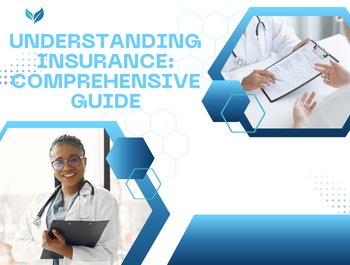Homeowners insurance is a cornerstone of financial stability and peace of mind for property owners. This comprehensive guide will delve into the essentials of homeowners insurance, from understanding its importance to choosing the right policy for your needs. Whether you’re a first-time homeowner or looking to reassess your current coverage, this article provides valuable insights to help you navigate the complex world of homeowners insurance.
What is Homeowners Insurance?
Homeowners insurance is a type of property insurance designed to protect your home and belongings against a variety of risks. This coverage typically includes protection against damage caused by fire, theft, vandalism, and natural disasters. Additionally, homeowners insurance often covers liability in the event that someone is injured on your property.
Key Components of Homeowners Insurance
1. Dwelling Coverage: This component covers damage to the structure of your home. It ensures that you can repair or rebuild your house if it’s damaged by covered perils such as fire, windstorm, or hail.
2. Personal Property Coverage: Personal property coverage protects your belongings, such as furniture, electronics, and clothing. This coverage extends to items damaged or stolen both inside and outside your home.
3. Liability Coverage: Liability coverage protects you from financial loss if you are found legally responsible for injuries or property damage that occur on your property. This can include medical expenses and legal fees.
4. Additional Living Expenses (ALE): If your home becomes uninhabitable due to a covered loss, ALE coverage provides funds for temporary housing and other living expenses.
Why Do You Need Homeowners Insurance?
1. Financial Protection: Homeowners insurance provides crucial financial protection by covering the costs associated with damage to your home or belongings. Without insurance, you would need to pay for repairs or replacements out of pocket.
2. Peace of Mind: Knowing that you have coverage for various risks helps you feel secure in your home. This peace of mind is invaluable, especially in the face of unexpected events.
3. Mortgage Requirement: Many mortgage lenders require homeowners insurance as part of the loan agreement. This ensures that the property is protected and reduces the lender’s risk.
4. Legal Protection: Liability coverage within homeowners insurance safeguards you against lawsuits or legal claims arising from accidents or injuries on your property.
Types of Homeowners Insurance Policies
Understanding the different types of homeowners insurance policies can help you choose the right one for your needs. Here are the most common types:
1. HO-1: Basic Form
The HO-1 policy provides basic coverage against a limited list of perils, including fire, theft, and vandalism. This form is rarely used today due to its limited protection.
2. HO-2: Broad Form
The HO-2 policy offers broader coverage than HO-1, including protection against additional perils like falling objects and the weight of snow or ice. It provides more comprehensive protection for your home and belongings.
3. HO-3: Special Form
The HO-3 policy is the most common type of homeowners insurance. It provides coverage for all perils except those specifically excluded in the policy. This form offers extensive protection for both your home and personal property.
4. HO-4: Renters Insurance
Designed for renters, the HO-4 policy covers personal property and liability but does not cover the structure of the building. It is ideal for individuals who rent their homes.
5. HO-5: Comprehensive Form
The HO-5 policy offers the most comprehensive coverage available. It covers a wide range of perils for both your home and personal belongings. This policy typically includes higher limits and fewer exclusions.
6. HO-6: Condominium Insurance
HO-6 policies are tailored for condo owners. They cover personal property and improvements made to the unit, as well as liability coverage. This policy complements the condo association’s insurance.
7. HO-7: Mobile Home Insurance
For owners of mobile or manufactured homes, the HO-7 policy provides coverage similar to that of HO-3 but specifically designed for mobile homes.
8. HO-8: Older Home Insurance
The HO-8 policy is designed for older homes that may not meet modern building codes. It provides coverage for the home’s actual cash value rather than replacement cost.
Factors Affecting Homeowners Insurance Rates
Several factors influence the cost of homeowners insurance premiums. Understanding these factors can help you manage and potentially reduce your insurance costs.
1. Location
The location of your home plays a significant role in determining insurance rates. Areas prone to natural disasters, high crime rates, or dense populations may have higher premiums.
2. Home Value and Size
The value and size of your home affect the cost of insurance. Larger homes with higher replacement costs generally require higher premiums.
3. Building Materials
Homes constructed with fire-resistant materials or equipped with safety features like security systems may qualify for lower insurance rates.
4. Claims History
Your claims history can impact your insurance premiums. Frequent claims may lead to higher rates, while a clean history may result in lower premiums.
5. Deductibles
Choosing a higher deductible can lower your monthly premium, but it means you’ll pay more out of pocket in the event of a claim.
6. Coverage Limits
The amount of coverage you select will influence your premium. Higher coverage limits typically result in higher premiums.
How to Choose the Right Homeowners Insurance Policy
Selecting the right homeowners insurance policy involves several considerations. Follow these steps to find a policy that meets your needs:
1. Assess Your Needs
Evaluate the value of your home and belongings to determine the amount of coverage you need. Consider any special risks, such as living in a flood-prone area.
2. Shop Around
Compare quotes from multiple insurance providers to find the best coverage at the most competitive rates. Be sure to review the policy details and exclusions.
3. Review Policy Details
Carefully read the policy terms and conditions to understand what is covered and what is excluded. Look for any additional endorsements or riders that may be necessary.
4. Check the Insurer’s Reputation
Research the insurance provider’s reputation and financial stability. Check customer reviews and ratings to ensure the company is reliable and responsive.
5. Consult an Insurance Agent
Consider consulting an insurance agent who can provide personalized advice and help you navigate the complexities of homeowners insurance.
Making a Homeowners Insurance Claim
If you need to file a claim, follow these steps to ensure a smooth process:
1. Report the Incident
Notify your insurance provider as soon as possible after the incident. Provide detailed information about the damage or loss.
2. Document the Damage
Take photos or videos of the damage to support your claim. Keep records of any repairs or temporary expenses incurred.
3. File the Claim
Submit the claim forms and supporting documentation to your insurance provider. Be prepared to provide additional information if requested.
4. Work with an Adjuster
An insurance adjuster may be assigned to assess the damage and determine the payout amount. Cooperate with the adjuster and provide any requested information.
5. Review the Settlement
Once the claim is processed, review the settlement offer to ensure it covers your losses adequately. If you disagree with the offer, you may negotiate or appeal the decision.
Common Homeowners Insurance Exclusions
While homeowners insurance offers extensive coverage, there are some common exclusions to be aware of:
1. Flood Damage
Standard homeowners insurance policies typically do not cover flood damage. Separate flood insurance may be required if you live in a flood-prone area.
2. Earthquake Damage
Earthquake damage is often excluded from standard policies. If you live in an earthquake-prone area, consider purchasing additional earthquake coverage.
3. Maintenance Issues
Damage resulting from lack of maintenance or wear and tear is generally not covered. Regular upkeep and maintenance are essential to prevent such issues.
4. High-Value Items
Valuable items such as jewelry, art, or collectibles may have limited coverage under a standard policy. Consider additional endorsements or riders for high-value items.
FAQs
What does homeowners insurance typically cover?
Homeowners insurance generally covers damage to the home and personal property, liability for injuries on the property, and additional living expenses if you need to stay elsewhere due to damage.
How can I lower my homeowners insurance premium?
You can lower your premium by increasing your deductible, improving home security, and shopping around for competitive quotes. Bundling policies with the same insurer can also result in discounts.
Do I need homeowners insurance if I rent my home?
Homeowners insurance is not required for renters. However, renters insurance provides similar protection for personal property and liability, and it is highly recommended.
How often should I review my homeowners insurance policy?
Review your homeowners insurance policy annually or whenever significant changes occur, such as home renovations or acquiring valuable items. Adjust your coverage as needed to ensure adequate protection.
What should I do if my claim is denied?
If your claim is denied, review the denial letter carefully and understand the reasons for the denial. Contact your insurance provider to discuss the issue, and consider filing an appeal if necessary.
How can I find the best homeowners insurance policy for my needs?
To find the best policy, assess your coverage needs, compare quotes from multiple insurers, review policy details, and consult with an insurance agent for personalized advice.
Homeowners insurance is a vital component of safeguarding your property and ensuring peace of mind. By understanding the coverage options, factors affecting rates, and how to choose the right policy, you can make informed decisions and protect your home effectively.




open account binance – create binance account
create binance account open account binance
Erstellen Sie ein Binance-Konto Kostenloses Konto erstellen Binance
If you’re experiencing delays with your Bitcoin transactions, our Bitcoin Transaction Accelerator can help speed them up. This tool is designed to prioritize your transaction, ensuring it gets confirmed faster on the network. It’s an essential resource for anyone looking to optimize their Bitcoin experience. Don’t let slow confirmations hold you back; discover the benefits of using an accelerator today!
انشاء حساب على بينانس Binance https://accounts.binance.com/ar/register/person?ref=775587485
Thanks for this very informative article! For anyone looking for a detailed step-by-step guide on creating a Binance account, here’s a helpful resource I found: How to Register an Account on Binance. Hope it’s useful!
Thanks for this very informative article! For anyone looking for a detailed step-by-step guide on creating a Binance account, here’s a helpful resource I found: How to Register an Account on Binance. Hope it’s useful!
As soon as I detected this website I went on reddit to share some of the love with them.
create wise account create wise account
guide to creating a Binance account Step-by-step : https://www.binance.com/en/support/faq/how-to-register-on-the-binance-website-08f314ad219e45fc9b7a27b67801a5c4?ref=775587485
Accelerate Your Bitcoin Transactions Secure, Fast, and Guaranteed! : https://www.btcaccelerator.io
How to Register an Account on Binance https://www.binance.com/en/square/post/15710503553490?ref=775587485
Create binance account : https://www.binance.com/en/square/post/15710503553490?ref=775587485
create binance Wealth Management Create Binance Wealth
guide to creating a Binance account Step-by-step : https://www.binance.com/en/square/post/15710503553490
t2g3xh